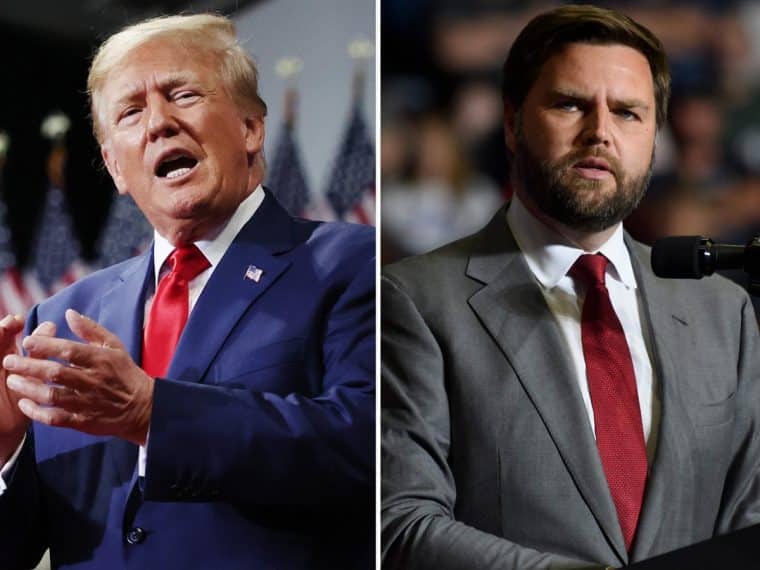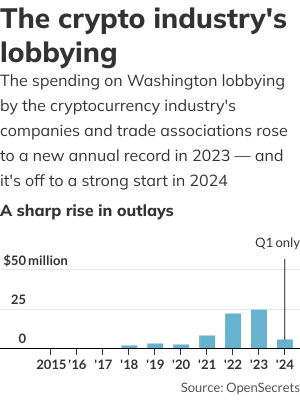The pro-crypto Senator JD Vance (R-Ohio) is reportedly gearing up to introduce a new bill that could dramatically reshape the regulatory landscape for digital assets in the United States.
The move comes as Vance’s name continues to be floated as one of the top picks of former President Donald J. Trump for the VP role for the upcoming 2024 Presidential Election, along with Tim Scott, Marco Rubio, and Doug Burgum.
According to sources familiar with the matter, Senator Vance has begun circulating draft legislation that aims to overhaul how the US regulates cryptocurrencies. The proposed bill is seen as an attempt to improve upon the Republican-led legislation named FIT21 that passed the House last month with bipartisan support.
Scarce Details of the New Bill Indicate Simpler Oversight Distribution
Key aspects of Vance’s proposed bill include a redefinition of the roles of the Securities and Exchange Commission (SEC) and the Commodity Futures Trading Commission (CFTC) in overseeing the crypto market.
This has been a heavily debated matter as crypto firms have argued that the SEC has overstepped its authority multiple times. They argue that the current rules around securities are much too vague and have begged for more guidance, to no avail. Instead, the SEC has tried to regulate by enforcement, launching investigations and lawsuits against top firms like Coinbase and Binance,
Sources indicate that Vance’s proposal is more favorable to the industry compared to FIT 21. One lobbyist who was interviewed by Politico emphasized that even though lawmakers will probably be reluctant to “start over”, the bill that Vance would bring up is “much, much better” from an industry perspective.
The draft reportedly includes a simpler approach to determining which digital assets fall under SEC oversight versus CFTC regulation.
Also read: Best Crypto Lawyers of 2024 – Who Tops the List?
This could provide much-needed clarity for crypto businesses operating in a complex regulatory environment. Vance’s team is reportedly aiming to introduce the bill next month, coinciding with the Republican National Convention, which is scheduled to begin on July 15.
The proposed legislation has already generated mixed reactions within the crypto industry. While some see it as a positive step toward fostering a better environment for firms in this space to innovate and grow within the boundaries of the low, others are cautious about its potential to harm the bipartisan support achieved by the FIT21 bill.
“Industry and the effort are much better served by preserving the bipartisan support that they’ve had … rather than moving to a more partisan product,” the lobbyist further commented.
Vance is a Crypto-Friendly Senator
Vance is a well-known supporter of the crypto space and this is hardly the first time he ventures into trying to create a robust regulatory framework that helps the industry move forward.
Last year, he introduced a bill that aimed to protect banks from the regulatory pressures they have faced recently that has led to them cutting their relationship with crypto firms to avoid heavy compliance burdens or undesired impact on their balance sheet.
Moreover, his crypto-friendly stance aligns with the growing relevance that Republicans are giving to policies and laws concerning this up-and-coming industry. According to the latest statistics, crypto lobbies and companies are preparing to pour around $160 million to help allies push forward favorable bills. It’s no wonder why Republicans (and a handful of Democrats) are suddenly so eagerly rooting for these businesses.
Also read: 10+ Best Crypto & Bitcoin eSports Betting Sites for 2024
As Vance prepares to make public his ambitions with this latest bills, the polls put him in the first spot as Trump’s most likely VP pick, just ahead of Senator Marco Rubio and North Dakota Governor Doug Burgum.
According to Polymarket wagers, Burgum has the lead in terms of probabilities with a 40% chance of being elected for this important role. Vance currently sits in second place with much lower odds of 15% while Rubio has received meager support from bettors with a 6% chance of being picked.
Vance is considered a strong ally to Trump’s “Make America Great Again” agenda, meaning that his appeal to hardline voters is one of his strongest feats.
Trump indicated recently that he has made up his mind already but has not yet informed the public who he picked. If Vance is picked, that could help him push through this crypto bill, but it still has a long journey through Congress either way.
Who is JD Vance?
JD Vance was born in Middletown, Ohio and he rose to national prominence after writing his bestselling memoir named “Hillbilly Elegy”, which discussed the many challenges faced by working-class communities in Appalachia.
Vance joined the Marine Corps and served in Iraq. He attended Yale Law School, worked in the technology industry, and eventually started an investment firm. He ultimately entered politics and announced his candidacy for the United States Senate in 2021 with the endorsement of President Trump despite being a rather vocal critic for a while. He won his Senate seat in 2023.
Also read: Top 10 Tech Companies in the World by Market Capitalization
At 39 years old, Vance would bring millennial energy to a ticket featuring the 78-year-old Trump. Moreover, his working-class background and appeal in the crucial swing state of Ohio could make him an attractive VP candidate.
However, one of the caveats of Vance joining Trump in the presidential race is that he would leave the Senate seat vacant, which will give Governor Mike DeWine the right to appoint a temporary replacement.
This would result in a shift in the agenda as Vance would no longer have an influence on the proposal that his state seat promotes and endorses. Trump could take this into account in the selection process depending on his intentions, ambitions, and priorities.
Vance Blasts SEC for Its ‘Unethical and Unprofessional’ Behavior in the DEBT Box Case

Vance recently showcased his support for the cryptocurrency industry with a letter addressing the actions taken by the SEC in the case involving DEBT Box, where the agency made false statements to obtain a court order to freeze the project’s assets.
“It is unconscionable that any federal agency—especially one regularly involved in highly consequential legal procedures and one that, under your leadership, has often pursued its regulatory mission through enforcement actions rather than rulemakings—could operate in such an unethical and unprofessional manner,” Vance and four other senators wrote.
This incident, according to Vance and his colleagues, undermined the public’s confidence in the SEC’s enforcement actions and compromised its mission to protect investors and maintain fair markets.
When it comes to crypto, other candidates like Doug Burgum are also open to innovation in the space as he supported the development of a crypto mining facility in a Cold War-era missile base in North Dakota.
Meanwhile, Rubio has not vocally supported the sector. In fact, he has been a critic on various occasions, expressing concerns about central banks issuing digital tokens – also known as CBDCs – and supporting bills that would prevent the Federal Reserve from issuing this type of asset.
Trump himself has positioned himself as a pro-crypto president and was the first candidate in U.S. history to accept donations in Bitcoin (BTC) and other cryptocurrencies. He has attended multiple fundraising events where he advocated to help the sector innovate and move forward (and pull in donations, of course), although he has not provided any details about the policies he intends to push forward to accomplish this goal.
Will Trump Be Able to Leave Vance’s Critics in the Past?
As Senator Vance prepares to introduce his crypto bill, its reception could play a crucial role in shaping both his political future and the regulatory landscape for digital assets in the United States.
If the bill gains traction, it could position Vance as a leading voice on crypto policy within the Republican Party. This could end up boosting his VP prospects as Trump’s agenda clearly includes gaining the sector’s favor.
However, the success of the bill – and the VP candidacy – are far from being a sure thing. The bill will likely face scrutiny from both sides of the aisle and its more industry-friendly approach could face resistance from those who favor stricter regulations for the crypto market.
Meanwhile, the speculation about Trump’s VP pick continues to intensify as the Republican National Convention approaches.
Vance’s journey from Trump critic to potential running mate coupled with his embrace of crypto-friendly policies illustrates the dynamic nature of Republican politics. If Trump picks him, it would show pragmatism as he would set aside these past riffs to join forces with a younger tech-savvy VP.

